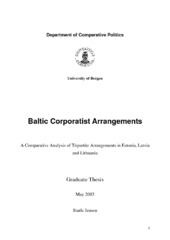| dc.description.abstract | The subject of this thesis is the development of tripartite arrangements between representatives of the trade union organisations, the employers’ organisations and the government or the state bureaucracy in Estonia, Latvia and Lithuania after the three countries regained their independence from the Soviet Union in 1991. I have studied and compared the contents of tripartite agreements and the work of tripartite councils. I have divided the time into the two periods from 1991 to the end of 1995 and from the beginning of 1996 to the end of 2001. I started the research with some assumptions. The first was that pressure from the EU after the three countries applied for membership in late 1995, would pull the countries towards developing stronger systems for tripartite bargaining at state level. Secondly, I assumed that openness of economy, measured as high value of trade as a proportion of GDP, would have a favourable effect on the development of tripartite arrangements. Thirdly, I assumed that long time of social democratic or socialist parties in government would have positive effect on the development of tripartite arrangements. Finally, I assumed that bloc politics combined with occurrence of radical shifts of all government parties simultaneously, would have negative effect on the development of tripartite arrangements at state level. When I had compared the systems of tripartite arrangements at state level, my major finding was that Estonia and Latvia were closer than Lithuania to a model of democratic corporatism by the end of 2001. I also found that all three countries were closer to a model of democratic corporatism on state level by the end of 2001 than by the end of 1995. These findings, combined with historical elaborations of the different factors, gave support to the assumption that pressure from the EU had contributed to strengthen the systems of tripartite arrangements at state level. Openness of economy could not explain the differences between the cases. The findings did not support the assumption about the role of social democratic or socialist parties in government. Lithuania was furthest from the model of democratic corporatism by the end of 2001, despite the fact that the social democratic party formed the government alone from late 1992 to late 1996. The only factor, which could explain the differences between the cases by the end of 2001, was the occurrence of bloc politics combined with radical shifts of governments. The conclusion is that this can explain why Lithuania was further away from a model of democratic corporatism than Estonia and Latvia by the end of 2001. | en_US |
